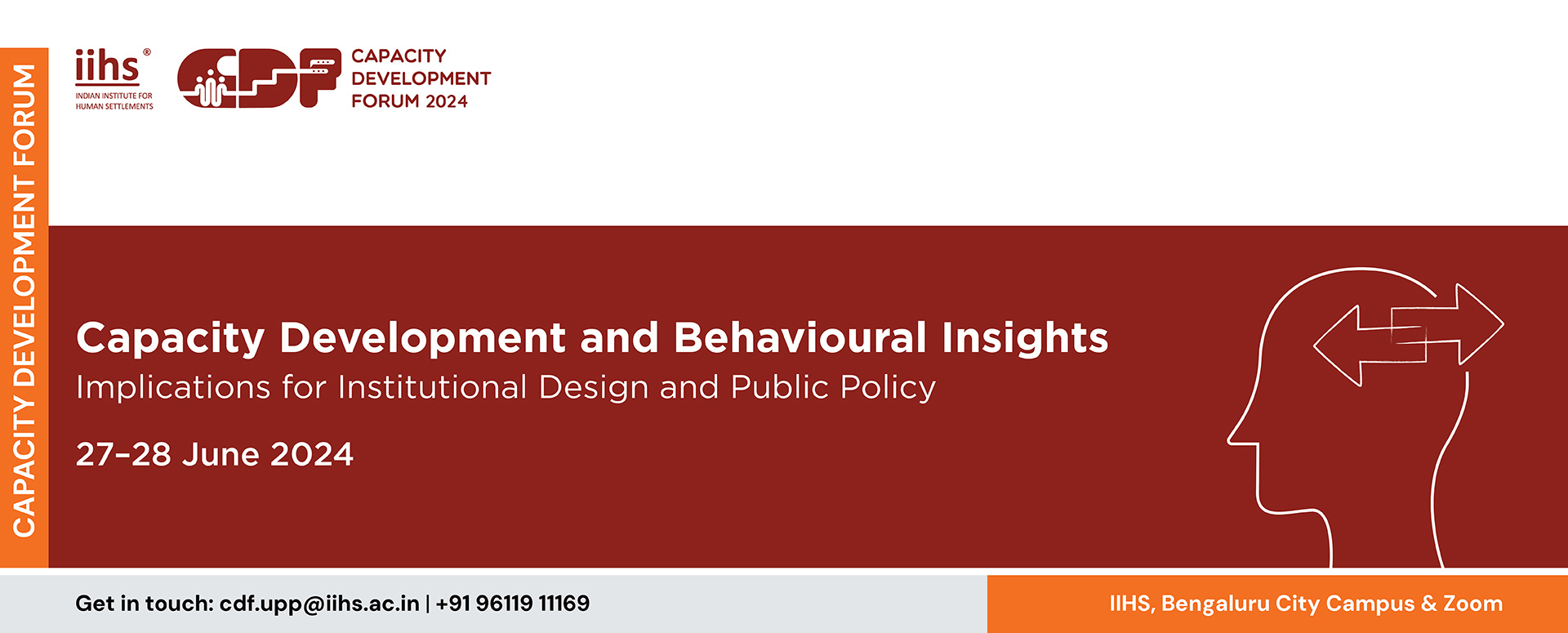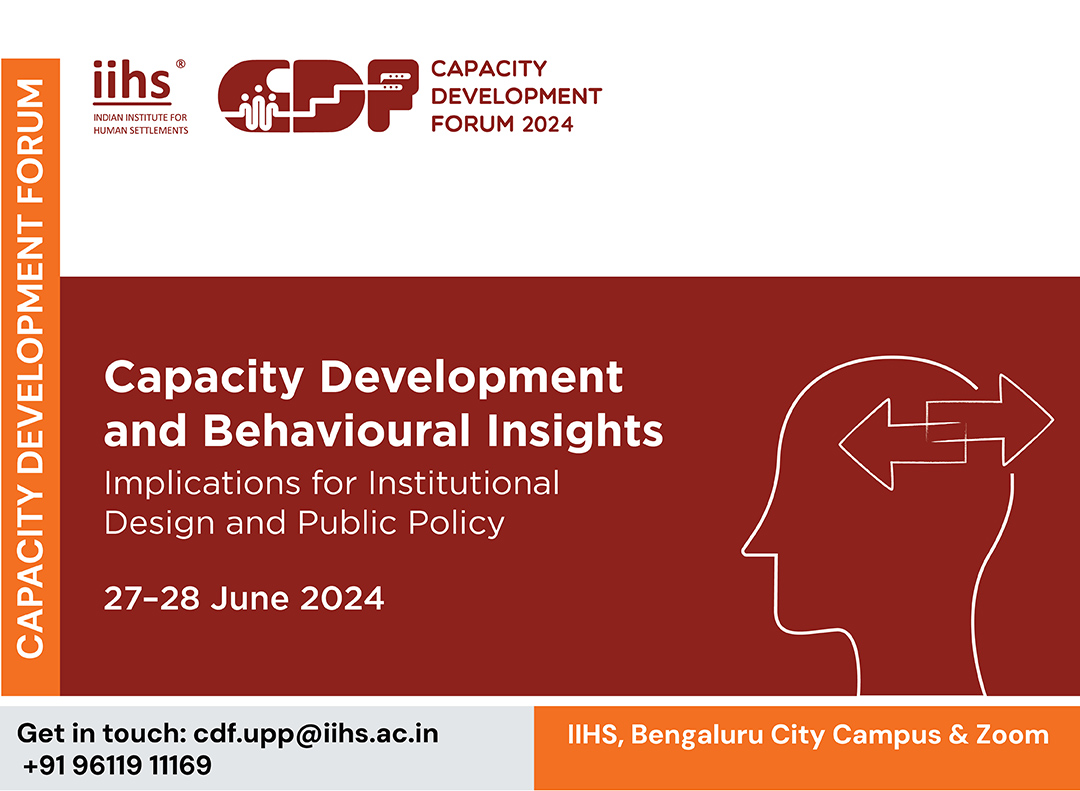27 – 28 June 2024
Get in touch on cdf.upp@iihs.ac.in or 9611911169


Get in touch on cdf.upp@iihs.ac.in or 9611911169
There is an increasing realisation that understanding human behaviours at an individual level, and how it impacts the institutions and societies they are situated within, is key to influencing them in ways that are crucial to achieving larger objectives. For employees and officials, both private and public, workplace behaviour and competencies influence performance and productivity that determines the value they can deliver to society. For citizens, it is not enough to just provide the necessary infrastructure and services, but it is also important to ensure their optimal uptake. Often, the right nudges and incentives influence the choices and behaviours that individuals make and display at any given time. In fact, governments across the world have established ‘Behavioural Insights Units’ and ‘Nudge Units’ to provide information and intelligence on how policies and programmes can be better designed, formulated, and implemented for them to be more effective.
Recognising the immense potential of Behavioural Science (BeSci), all UN Entities have actively begun applying its principles in their areas of work, with an aim to improve policy and programme effectiveness, and to improve administrative support systems, policies and processes.
In India, missions such as the Swachh Bharat Mission (sanitation and municipal solid waste management) and the Jal Jeevan Mission (water) adopt behaviour change communication on a large scale. A few other examples of sectors that need to influence behaviour for tangible and lasting change are public health, social welfare, urban transit, and energy sectors. Behaviour change is a critical component of Mission Karmayogi which seeks to change the workplace behaviour of bureaucrats and public servants from ‘Karmachari’ to ‘Karmayogi’. In addition, policy objectives are achieved not just by the public, but more so by the private sector. For example, climate change adaptation and mitigation goals, and sustainable development goals need a ‘whole of society’ approach where everyone is involved, right from the government i.e., the law and policy makers, the public sector, the private sector, the NGO, and not-for-profit sectors, as well as citizens. This means that the role, and therefore behaviour of intermediaries in infrastructure and service provision (e.g. doctors and ASHA workers in public health and nutrition, real estate developers in climate change and sustainability, private sanitation service providers in WASH, cab and auto drivers in urban transit) also becomes crucial.
Effecting changes in behaviour requires sustained capacity development of everyone involved, right from policy makers to intermediaries and the on-ground implementation staff. Do we have the expertise to incorporate behavioural insights into our policies and programmes? What capacities are required, and how do we build them across sectors, and at which levels? Are there any frameworks that can guide our approach to incorporating behavioural insights? What kinds of pedagogical approaches are most suitable to affect changes in behaviour? Are there any pointers for effective behaviour change communication? What auxiliary efforts should accompany behaviour change communication to establish the desired behaviours and cause the requisite changes? What is the role of leadership in effecting behaviour change in cadre and organisations? What can we learn from international perspectives on efforts to institutionalise behavioural insights?
CDF 2024 was held on 27–28 June 2024 in a hybrid format at the IIHS Bengaluru City Campus and online. The convening brought together stakeholders from a range of sectors to discuss how the understanding of human behaviour and motivations is key to achieving larger societal objectives not only at an individual level but also at the institutional one. Panels at the convening discussed how nudges and incentives can be used to influence human behaviour and inform the design, formulation and implementation of policies and programmes to make them more effective.
The convening assembled a diverse group of practitioners, policymakers, and researchers to explore the application of behavioural insights in capacity development. The discussions highlighted emerging trends and best practices, fostering collaboration between public and private sector stakeholders.
Day 1 included panel discussions that delved into practical frameworks for embedding behavioural insights into policy making. Experts from both private and public domain highlighted the importance of leadership in fostering an organisational culture receptive to change, especially in response to external pressures like technological advancements or policy shifts. The evening began with a performance showcasing IEC activities for behaviour change among the community. A networking dinner was hosted as part of CDF’s Community of Practice in Capacity Development, with representatives from training entities and knowledge institutions participating.
Day 2 involved a deep dive into cases from different sectors.The event culminated with a game-based workshop on pedagogical tools for enabling capacity development for behaviour change.
The IIHS Library hosted an exhibition on capacity development and the strengthening of public institutions over the two days.
| DAY 1 – THURSDAY, 27 JUNE, 2024 | |
| 10:00 am – 10:30 am | Welcome Address |
| 10:30 am – 11:20 am | Keynote Address |
| 11:20 am – 11:45 am | TEA BREAK |
| 11:45 am – 01:00 pm | Panel 1 – Policy capacity and incorporating behavioural insights |
| 01:00 pm – 02:00 pm | LUNCH BREAK |
| 02:00 pm – 03:15 pm | Panel 2 – International perspectives : Role of CB agencies in developing BeSci capacities of public officials |
| 03:15 pm – 03:45 pm | TEA BREAK |
| 03:45 pm – 05:00 pm | Panel 3 – Role of Leadership in organisational behaviour change |
| 05:00 pm – 05:15 pm | Closing Remarks |
| 06:30 pm onwards | Behaviour Change Communication – performance and networking dinner |
| DAY 2 – FRIDAY, 28 JUNE, 2024 | |
| 10:30 am – 12:30 pm | Learning Exchange Hub: Cases from Practice |
| 12:30 pm – 01:00 pm |
Library Exhibition Walkthrough – People and Policy
|
| 01:00 pm – 02:00 pm | LUNCH BREAK |
| 02:00 pm – 04:30 pm | Learning Workshop |
Keynote Address
Dr. Gayathri Vasudevan, Chief Impact Officer – Sambhav Foundation, delivered the keynote address. Drawing on her experience of over 25 years working with underprivileged youth and the informal sector, she highlighted the complexities of behavioural challenges within education, skilling, and the employment continuum. She highlighted the paradox of high unemployment and the shortage of skilled workers in India, attributing it to people’s perceptions, attitudes, and behaviours, which affects their willingness to take up certain jobs and their suitability for available jobs.

Gayathri Vasudevan
Chief Impact Officer
Sambhav Foundation
Gayathri Vasudevan has a doctorate in Development Studies with more than 23 years of consistent work for the underprivileged in India. A research scholar on gender issues, she has spent the initial years of her career in rural India, working at the grass root levels, during which time she consulted with international developmental organisations such as UNDP, UNICEF, NORAD, and the World Bank, among others, working on development initiatives.
In 1999, Gayathri joined the ILO, a UN agency dealing with labour issues, with the mission to make a difference in poverty-stricken nations of the world. Later, she co-founded Sambhav Foundation in 2006, with a vision to enable livelihoods of people working in the informal sector through Education, Employability and Entrepreneurship programs. So far, her work has impacted the lives of more than half a million in India.
Panel 1: Policy capacity and incorporating behavioural insights
This panel aimed to address the importance of policy capacity and its role in promoting policy actors’ abilities and motivation for effective policy implementation; the role of behaviour science in the process of creating, implementing, and assessing effective policies and other key questions.
Key Takeaways –
 Apoorve Khandelwal
Apoorve Khandelwal
Senior Programme Lead
Council on Energy, Environment and Water
Apoorve leads the Sustainable Food Systems program at the Council on Energy, Environment and Water. He has invested almost a decade working on different sustainability challenges in the arena of bioeconomy (food, feed, fibre, and fuel), approaching them from different angles. While Apoorve has developed advanced biofuel and biomaterial technologies for a Fortune 500 and developed policy recommendations as part of satellite policy-research teams set up by Govt. of India, he has also led strategy consulting projects to advise agro-food organisations in Europe, North America, Africa, and Asia on a variety of sustainability issues. However, the consistent theme throughout this journey has been systems thinking, interdisciplinarity, and collaborative action.
 Nila Mohanan, IAS
Nila Mohanan, IAS
Joint Secretary
Department of Personnel & Training
Nila is a civil servant in the Indian Administrative Services (IAS) with over 16 years of experience as a public policy practitioner in governance and strategic management. Her core competencies are in public advocacy, public policy formulation and implementation, budget planning, innovative public service delivery, multi-stakeholder policy modelling, and building cross-sectoral partnerships. Nila’s areas of specific expertise in public policy formulation and implementation include human resource management, healthcare, education, industry and commerce, citizen service delivery and change management. Nila holds an MPhil in International Politics (CIPOD, SIS, JNU).
 Shagata Mukherjee
Shagata Mukherjee
Deputy Director, Centre for Social and Behavioral Change (CSBC), Ashoka University
Academic Lead of Behavioural Insights Unit (BIU) of India, NITI Aayog
Prior to this position, Shagata was an Associate Professor of Economics and Public Policy at the Meghnad Desai Academy of Economics. He was also a Visiting Fellow at the Mumbai School of Economics and Public Policy at the University of Mumbai and an Affiliated Faculty at the Centre for Experimental Social Sciences (CESS) Nuffield -FLAME. He received the Vernon L. Smith Young Talent Award in Experimental Finance for his research on gender and microfinance. He is a co-founder of the Mumbai Behavioural Network.
Shagata holds a PhD in Behavioural and Experimental Economics from the Andrew Young School of Policy Studies at Georgia State University, a master’s degree in Economics from Jawaharlal Nehru University and a B.Sc. in Economics from Presidency College.
Panel 2: International perspectives : Role of CB agencies in developing BeSci capacities of public officials
This panel aimed to address whether agencies like Nudge Units, Behavioural Insights Units and other CB agencies design their course offerings and curricula, and if there are state policies in place to direct the capacity building of public administrators as well as the courses they offer.
Key Takeaways –
 Christopher Ng
Christopher Ng
Managing Director
Civil Service College (CSC), United Kingdom
At CSC, Chris has overall responsibility for training operations, partnerships, finance and communications. He works closely with the Chief Executive in the strategic development of the college to ensure CSC’s learning solutions reflect the changing demands of the public sector in the UK and abroad. With experience in collaborating with both UK and international public bodies, Chris specialises in designing and managing the delivery of capacity- and capability- building programmes. Since joining CSC in 2013, Chris has partnered with over 15 governments across the Commonwealth and several non-Commonwealth countries. He has established a strong working relationship with Asian governments, particularly with India and Taiwan’s government training institutions, maintaining these partnerships since 2016 and 2018 respectively. Chris has organised training programmes for delegations from Bangladesh, China, India, Indonesia, Malaysia, Mauritius, Pakistan, Singapore, South Korea, Sri Lanka, Taiwan, UAE and Vietnam. Leading the International team, he has successfully delivered training to groups exceeding 100 delegates in a single cohort. Chris holds a bachelor’s degree from the University of Warwick and a master’s degree from the London School of Economics.
 Dominic Byarugaba
Dominic Byarugaba
CEO and Executive Director
African Institute for Capacity Development (AICAD), Kenya
Dominic has been with the African Institute for Capacity Development (AICAD) since 2014. The AICAD brings together Public and Private Universities in Kenya, Tanzania and Uganda that subscribe to AICAD’s mandate on top notch Research, Training, Extension and Information Repository Platforms.
Dominic holds a PhD in Pharmacognosy (MUST/UCT), a Master’s in Ethnobotany, and a Bachelor’s in Botany and Chemistry from Makerere University, Kampala, Uganda. He has vast experience in research with a focus on indigenous knowledge and citizen science innovations with respect to pharmacognosy and shared standards in orthodox or conventional structures of therapy.
He is published widely and is an Editor with the Blackwell and Cambridge Publishing Houses. He is passionate about mentorship in emerging issues through the vast network of global, continental, regional and national organisations.
 Voravate Chonlasin
Voravate Chonlasin
Executive Director, AIT Extension, Asian Institute of Technology
Director, United Nations Institute for Training and Research (UNITAR), International Training Centre for Authorities and Leaders (CIFAL) Bangkok
Voravate leads the AIT Extension of the Asian Institute of Technology, Thailand, to provide academic service on executive education, organisation development and capacity enhancement in the recent development areas, such as climate change, SDGs, financial risk management, green and circular economy, municipality development, etc. He also serves as Senior Program Specialist in which he takes a leading role in the design and development of capacity building programmes to enhance the capacity of public sector organisations in developing countries.
Voravate manages and directs programmatic teams to implement capacity development and training activities in the areas of performance-based management, public policy and administration, monitoring and evaluation and human resources development (HRD).
Voravate earned his B.Sc. in Soil Science from King’s Mongkut Institute of Technology Lad Krabang (KMITL) in 1989 and M.Sc. in Regional and Rural Development Planning of AIT School of Environment, Resources and Development (SERD) in 1994.
Panel 3: Role of leadership in driving behaviour change
This panel aimed to address imperative questions like what characteristics / attributes do leaders need to possess to drive behaviour change and how can these characteristics / attributes be built in potential leaders? How to measure behaviour change and what are some in-process measures we can use to measure behaviour change?
Key Takeaways –
 Amit Narayan
Amit Narayan
Partner
Control Risks
At Control Risks, Amit has led the firm’s engagements with clients, partners and associates in India and across South Asia since January 2018. He holds a seat on the Asia Pacific Regional Executive Committee.
Based in Mumbai, Amit has over 25 years of experience working across India as well as across Asia Pacific managing operational risks for multinational firms. He has advised clients on political and regulatory risk, pre-investment risk, public policy, labour disputes and stakeholder mapping across the sub-continent.
Amit has worked with multinational firms such as Edelman, Vodafone, The Walt Disney Company and Cable & Wireless previously. He has conducted over 100 days of crisis management and risk mitigation strategy workshops as well as scenario planning exercises with corporations. He holds a bachelor’s degree in economics from the Shri Ram College of Commerce, Delhi University and a master’s degree in business economics from Delhi University. He is CQI and IRCA Certified Business Continuity Management Systems (ISO 22301:2019) Lead Auditor.
 Manish Dubey
Manish Dubey
Chief – Practice
Indian Institute for Human Settlements (IIHS)
Manish is a governance and institutional development expert with nearly 25 + years of consulting experience with national and state governments, multilateral and bilateral development partners, INGOs, and philanthropies. His experience spans the rural and urban water supply and sanitation (WSS), urban development, natural resource management, and rural livelihood sectors across 20 Indian states. Among his clients have been the World Bank, UNICEF, Asian Development Bank, Australian Agency for International Development, DFID, Global Sanitation Fund, and Swedish International Development Agency.
Key areas of Manish’s work include institutional design and strengthening, programme design and strategy, reform management support, strategic stakeholder communication and sector, portfolio and programme level result
 Ramesh Ramaswamy
Ramesh Ramaswamy
Vice President, Business Head, APAC
BoschSDS
With a career spanning 25 years, Ramesh has successful experiences delivering results in challenging business situations, complex organisational structures and with extremely diverse cultural landscapes, across various domains like Automotive, Industrial Manufacturing and Aerospace. He has successfully crafted new portfolios in Digital i4.0 solutions & Data Analytics, established successful Enterprise System Services and Automotive Product Engineering businesses in various geographies across India, Germany, Mexico & China.
Behaviour Change Communication – Performance
At the end of the panel discussions on Day 1, Team Green Stage performed a street play, “Kasa Nova“, which emphasised the need for behavioural change in waste management practices in cities.
Through “Kasa Nova,” they aimed to demonstrate to the attendees how IEC activities can inspire communities to take actionable steps towards better waste management and environmental stewardship. The attendees had the opportunity to interact with the performers to ask questions about their experiences with community engagement.
Team Green Stage has performed more than 500 street plays since its inception in 2009, significantly impacting various communities and organisations. The team has performed several plays for Bruhat Bengaluru Mahanagara Palike (BBMP), Karnataka State Pollution Control Board (KSPCB), Kidwai Hospital, and Namma Bangalore Foundation, among others.
Learning Exchange Hub: Cases from Practice
The Learning Exchange Hub provided an opportunity for practitioners to come together and share their experiences from their respective sectors with the community of practice and an opportunity for cross-sectoral learning from the ground. It was framed as a series of case presentations from practitioners on capacity building interventions from various sectors focusing on behavioural insights, behavioural barriers, behavioural interventions and their outcomes. Cases from health, urban mobility, disaster risk reduction, sanitation, solid waste management, and environment sectors were presented.
Sectoral Experts:
| Amarpreet Kaur Project Officer – Communications & IEC Centre for Environment Education |
Aswathy Dilip Managing Director ITDP India |
| Bhupendra Mishra Program Manager, Aga Khan Agency for Habitat India Founder, The Resilient Foundation |
C R Magesh Scientist C Ministry of Environment, Forest and Climate Change National Museum of Natural History Government of India, New Delhi |
| Krishna Raj Professor Center for Economic Studies and Policy (CESP) Institute for Social and Economic Change (ISEC) |
Rohini Pradeep Senior Program Manager CDD India |
| Sanskriti Menon Senior Programme Director Centre for Environment Education |
Usha Manjunath Director Institute of Health Management Research |
Learning Workshop: Concepts, methods, and tools for designing behavioural interventions
The learning workshop offered a hands-on toolkit-based approach to the application of behavioural insights in intervention design in the development sector. The workshop introduced behavioural biases to the participants through a game-based learning approach, then emphasised designing nudges with their role in mitigating biases. The participants were exposed to the four-step process of application of behaviour insights in India – from identifying behaviour barriers, designing behavioural interventions, methods of evaluation, and scaling up strategies. The participants were provided with worksheets for hands-on activity and essential reference materials to ensure maximum uptake of learning and transferability to their sectors of work.
Facilitators:
 Shagata Mukherjee
Shagata Mukherjee
Director, Centre for Social and Behaviour Change, Ashoka University
Academic Lead, Behavioural Insights Unit of India, NITI Aayog
 Akarshik Banerjee
Akarshik Banerjee
Researcher, Centre for Social and Behaviour Change
Ashoka University



